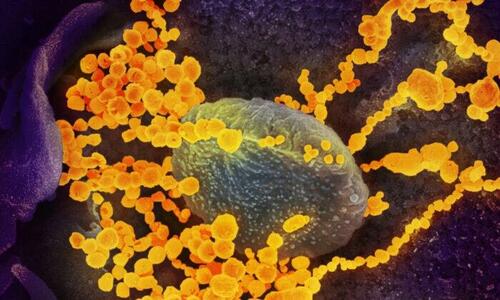CDC: New COVID Variant KP.3 On The Rise Across The US
Authored by Jack Phillips via The Epoch Times (emphasis ours),
A newly discovered COVID-19 variant, KP.3, is rising to become the dominant strain of the virus across the United States, according to the Centers for Disease Control and Prevention (CDC).
KP.3 constitutes about 25 percent of all COVID-19 cases detected by the agency. It’s followed by the KP. 2 and LB. 1 variants, which make up about 22 percent and 14 percent of all cases, respectively, the data show.
The latest COVID-19 data were collected over a two-week period from May 26 to June 8. Some media outlets have referred to both the KP.2 and KP.3 variants as “FLiRT,” due to where spike proteins are located.
The Epoch Times contacted the CDC for comment on June 12.
“CDC predicts that KP.3 is growing and will become the most common SARS-CoV-2 lineage nationally,” a CDC spokesperson told several news outlets this week about the variant’s dominance. “CDC is working to better understand its potential impact on public health.”
But the data suggest that despite the increase in the KP.3 variant’s prevalence, the U.S. is currently seeing low levels of COVID-19 activity overall.
A CDC graph of COVID-19’s historic trends shows that weekly deaths are at the lowest point since the pandemic started in early 2020. Virus-linked hospitalizations are also at their lowest point, the data show.
“Most key COVID-19 indicators are showing low levels of activity nationally, therefore the total number of infections this lineage may be causing is likely low,” the CDC spokesperson said.
Andy Pekosz, a molecular microbiology professor at Johns Hopkins University, said that the KP.2 and KP.3 variants do not appear to be more or less severe than prior COVID-19 strains. Instead, most people have COVID-19 antibodies either through a previous infection or vaccines.
“The period of infectiousness for these FLiRT variants remains the same as with JN.1 and previous omicron variants: After exposure, it may take five or more days before you develop symptoms, though symptoms may appear sooner,” he said in a question and answer session that was published on the university’s website.
“You are contagious one to two days before you experience symptoms and a few days after symptoms subside. And as with previous variants, some people may have detectable live virus for up to a week after their symptoms begin, and some may experience rebound symptoms.”
COVID-19 Reports No Longer Required
Last month, the CDC said that hospitals will no longer have to report COVID-19-related hospital admissions, hospital capacity, or related information. The changes went into effect on May 1.
The old “data will be archived as of May 10, 2024, and available at United States COVID-19 Hospitalization Metrics by Jurisdiction, Timeseries,” according to a statement posted on the CDC website at the time.
But the agency still encouraged medical facilities to report COVID-19 hospitalizations and related information to the federal health agency.
“A key lesson we learned from the COVID-19 pandemic is the importance of having reporting systems in place before an active emergency,” a CDC spokesperson said.
“These data have a significant and ongoing value for protecting patient health and safety as well as public health,” the statement added.
A U.S. Food and Drug Administration (FDA) panel, which authorized every previous COVID-19 vaccine that has been on the market, voted this past week to manufacture new booster shots to target strains derived from the JN.1 variant, which include KP.2 and KP.3.
A survey released earlier this year said that one in five Americans believe COVID-19 is a “major threat” to the U.S. population, a sharp decline from a high of 67 percent in the summer of 2020.
Tyler Durden
Sat, 06/15/2024 – 09:20
via ZeroHedge News https://ift.tt/P92U01B Tyler Durden
